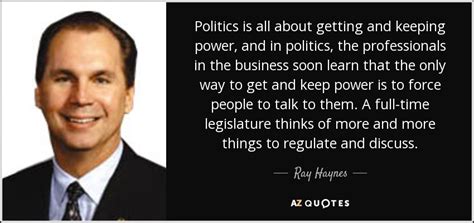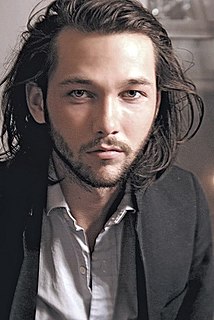A Quote by Ngugi wa Thiong'o
We think of politics in terms of power and who has the power. Politics is the end to which that power is put.
Related Quotes
If you take the conflicts we are used to dealing with, race over the years in America, and you combine that with the desire or aspiration to political power or taking power from other people, which is what politics is all about, you end up with a lot more friction than you would normally see with just straight-ahead politics.
Politics is about power. It is about the power of the state. It is about the power of the state as applied to individuals, the society in which they live and the economy in which they work. Most critically, our responsibility in this parliament is how that power is used: whether it is used for the benefit of the few or the many.
For authoritarians such as Lenin and Žižek, the dichotomy in politics is state power or no power, but I refuse to concede that these are the only options. Genuine politics is about the movement between these poles, and it takes place through the creation of what I call "interstitial distance" within the state.
Let no one ever shy away from the claim that Jews have power, that Jews have influence. We have learned the terrible lesson of history; that unless we have influence and power, disproportionate to our small numbers - immoral results will occur. We need power. And we must continue to use our power. Power which we earned, power which no one gave us on a silver platter, power which we worked hard for - use that power in the interests of justice.
Of course, in the reality of history, the Machiavellian view which glorifies the principle of violence has been able to dominate.Not the compromising conciliatory politics of humaneness, not the Erasmian, but rather the politics of vested power which firmly exploits every opportunity, politics in the sense of the "Principe," has determined the development of European history ever since.
Economics now drives politics. This gives us a system in which the relationship between power and politics is no longer fused. Power is global. We have an elite that now floats in global flows. It could care less about the nation-state, and it could care less about traditional forms of politics. Hence, it makes no political concessions whatsoever. It attacks unions, it attacks public schools, it attacks public goods. It doesn't believe in the social contract.
When you think of power, you think the state has power. When you look at it in terms of revolution, in terms of the state, you think of it in terms of Russia, the Soviet Union, and how those who struggled for power actually became victims of the state, prisoners of the state, and how that led to the dissolution of the Soviet Union. We have to think of revolution much more in terms of transitions from one epoch to another. Talk about Paleolithic and Neolithic.






































